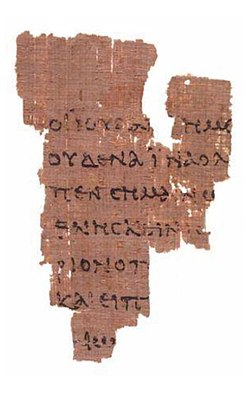John 18
| John 18 | |
|---|---|

John 18:31-33 on John Rylands Library Papyrus P52 (recto), written ca. AD 125.
|
|
| Book | Gospel of John |
| Bible part | New Testament |
| Order in the Bible part | 4 |
| Category | Gospel |
John 18 is the eighteenth chapter of the Gospel of John in the New Testament of the Christian Bible. It records the events on the day of the crucifixion of Jesus Christ, starting with His arrest. The book containing this chapter is anonymous, but early Christian tradition uniformly affirmed that John composed this Gospel.
Events recorded in this chapter took place in Jerusalem.
The New King James Version organises this chapter as follows:
The opening of chapter 18 is connected directly with the final words of chapter 14:
John 18:1 begins:
Some translations instead open with "When He had finished praying" or similar words.
Matthew 26:36 and Mark 14:32 name the garden as "Gethsemane" but the garden is unnamed here.
Judas is now called "Judas the betrayer" or "Judas, who is betraying" (Greek: ιουδας ο παραδιδους, ioudas ho paradidous) (John 18:2 and again in verse 5). He comes to this familiar place with troops, a captain and officers and servants of the chief priests and the Pharisees, carrying torches and lanterns and weapons (verse 6, cf. verse 12). Anglican bishop Charles Ellicott surmises that Gethsemane might have been belonged to "a friend or disciple" of Jesus. The New American Standard Bible notes that the troops were the Roman cohort (Greek: σπεῖρα, speira in John 18:3 is the technical word for the Roman cohort) whereas Richard Francis Weymouth identified them as a detachment of the Temple police. This was the garrison band from Fort Antonia, at the north-east corner of the Temple. Peter also came with a weapon (verses 10-11):
...
Wikipedia
